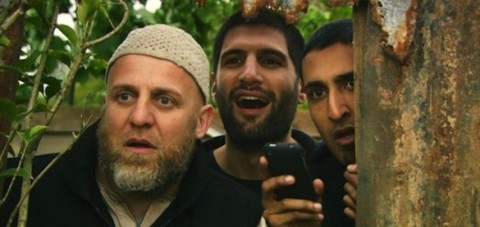The disappearance of a pregnant preteen exposes the raw wounds at the heart of an isolated southern New Zealand community in the absorbing and richly atmospheric Top of the Lake . Centered around Elisabeth Moss’ excellent performance as a detective for whom the case uncovers disturbing echoes of her own troubled history, this multistranded crime saga from writer-director Jane Campion and co-creator Gerard Lee is satisfyingly novelistic in scope and dense in detail. Yet it also boasts something more, a singular and provocative strangeness that lingers like a chill after the questions of who-dun-what have been laid to rest. Prestigious berths in Park City and Berlin will precede a distinguished smallscreen life for the Sundance Channel miniseries, which begins airing March 18. The six-hour, seven-part production (reviewed from a six-episode version prior to its festival bows) should prove an enticing proposition for fans of investigative dramas in the vein of Twin Peaks and The Killing , even though the yarn’s less procedural-oriented nature and primary focus on a rape case provide early clues that Campion and Co. are treading different thematic territory here. But by far the material’s most distinctive element is its setting, a wooded region of stunning natural beauty and surpassing human ugliness that lends a uniquely bleak and bitter tang to this well-worn genre format. Sharing helming duties with Aussie newcomer Garth Davis, Campion has delivered her first work set and shot in her native New Zealand since The Piano 20 years ago. Fittingly, it marks a reunion of sorts with that film’s star, Holly Hunte r, cast here as GJ, an enigmatic, silver-haired guru who has come to the town of Laketop to open a camp for abused and/or abandoned women. Unfortunately, the camp has been built on a piece of land — the ironically named Paradise — that has long been eyed by local drug lord Matt Mitcham (a superb Peter Mullan), who seems to own everyone and everything in town. Mitcham also seems to have fathered half the local population; the youngest of his offspring is 12-year-old Tui (Jacqueline Joe), his daughter by his third (ex-)wife, a Thai immigrant. One frigid morning, Tui is seen wandering into the titular lake, as though in a trance; a subsequent medical examination reveals she’s five months pregnant, though she won’t disclose who the father is. The determined but relatively inexperienced Det. Robin Griffin (Moss) is called in to lead the statutory-rape investigation, although she soon finds herself looking into a possible kidnapping-murder scenario when Tui suddenly goes missing. Over the course of the six-hour running time, the story abounds in the requisite twists and complications: The lake coughs up the body of a local businessman, while suspicion falls on a hermit who turns out to be a convicted sex offender. But these developments are doled out at a measured clip, and the filmmakers seem less interested in sustaining forward momentum than in painting a vivid panorama of this broken community, a town cloaked in a dark and vaguely incestuous malaise. From the hooligans (Jay Ryan, Kip Chapman) who carry out Mitcham’s bidding to the sad-sack women who gather at GJ’s camp, there’s a pervasive sense of human lives either wasted or forced into familiar and depressing patterns. The wildness of the surroundings informs the wildness of the characters: Parents and children are forever at odds, and acts of violence and violation are distressingly commonplace, to the point where even Mitcham reacts to the news of Tui’s ordeal not with outrage, but with a cynical roll of the eye (“She’s a slut, like her dad was a slut!”). Despite its narrative breadth, Top of the Lake is first and foremost Robin’s story. As the detective rekindles a romance with another Mitcham son (Thomas M. Wright) while flirting erratically with her superior officer (David Wenham), she finds her personal life bumping up against her investigation to a near-ludicrous degree. Much of the third hour is devoted to exploring Robin’s past traumas as a teenager, and while the idea that she sees a younger version of herself in Tui represents perhaps the tale’s most conventional conceit, it supplies a potent emotional fulcrum that pushes the drama into its moving, startling if not always plausible final hours. Moss, a long way from Mad Men , brings a gripping combination of pluck, vulnerability and intense anger to the complicated role of a woman who fights for every inch of ground and at one point drives a broken bottle into a man’s chest. Campion’s films have long gone against the grain with their strong, embattled distaff protagonists and daring portrayals of female sexuality, and if Top of the Lake isn’t in quite the same neighborhood as In the Cut , it nonetheless calls on Moss and others to bare themselves physically and emotionally in a story located at the juncture of sex and violence. The other commanding turn here comes from Mullan, playing the unkempt Mitcham as a rough-mannered scoundrel who is not without a certain gruff, randy charm. Other bright spots in the excellent ensemble include Robyn Nevin, tough and sensible as Robin’s cancer-stricken mother; Joe, who invests Tui with a fiery refusal to be victimized; and Hunter, making the most of dialogue that basically consists of a string of gnomic pronouncements. Adam Arkapaw’s lensing of this unspoiled and unruly landscape is one of the production’s chief pleasures, and composer Mark Bradshaw supports the action with a melancholy score that sounds entirely endemic to the setting. Editor’s Note: Top of the Lake begins airing on the Sundance Channel, Monday, March 18. Follow Movieline on Twitter.

View original post here:
REVIEW: ‘Mad Women’? Elisabeth Moss Bares Her Teeth & Body In Jane Campion’s ‘Top Of The Lake’




























